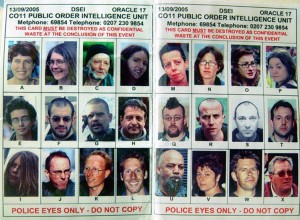 There has been a slew of incredible, and disturbing, reporting by the UK Guardian recently on how police have rebranded activism as “domestic extremism” and “domestic terrorism.” Environmental activists, antiwar activists, animal rights activists and many more groups have been targeted. Specifically, police have gathered personal information on thousands of activists who simply attend protests or political meetings, and created massive national databases.
There has been a slew of incredible, and disturbing, reporting by the UK Guardian recently on how police have rebranded activism as “domestic extremism” and “domestic terrorism.” Environmental activists, antiwar activists, animal rights activists and many more groups have been targeted. Specifically, police have gathered personal information on thousands of activists who simply attend protests or political meetings, and created massive national databases.
For instance, this “spotter card” was distributed to police officers in preparation for protests at Britain’s largest arms fair. According to the Guardian:
These so-called “spotter cards” are issued by police to identify individuals they consider to be potential troublemakers because they have appeared at a number of demonstrations.
One of the individuals featured at ‘H’ is Mark Thomas, a comedian and political activist. He has no criminal record. In a column, he noted how this scaremongering reflects truly misplaced priorities:
While being wanted outside the arms fair, I was legitimately inside researching a book on the subject, and uncovered four companies illegally promoting “banned” torture equipment.
Perhaps the most important bit of information, I think, is buried a bit in the story. According to this investigative piece by the Guardian:
Acpo’s national infrastructure for dealing with domestic extremism was set up with the backing of the Home Office in an attempt to combat animal rights activists who were committing serious crimes. Senior officers concede the criminal activity associated with these groups has receded, but the units dealing with domestic extremism have expanded their remit to incorporate campaign groups across the political spectrum, including anti-war and environmental groups that have only ever engaged in peaceful direct action.
If you’re familiar with this site and the Green Scare, you know that one of the key points I try to hit home, repeatedly, is that environmental and animal rights activists may be among the first targets in these political crackdowns, but they will not be the last. By the admission of some government officials in the UK, this has clearly been the case.
Whether or not that has been the official policy in the United States, the same dynamic is at play. If we do not stop the terrorism rhetoric, legislation, court cases and scare-mongering in its tracks, no activist and no social movement will remain untouched.
Of course, you could always just continue listening to the soundbites of police and government officials, like this one from Anton Setchell, who is in charges of the “domestic extremism” unit in the UK. People who find themselves on the databases, he says, “should not worry at all.”